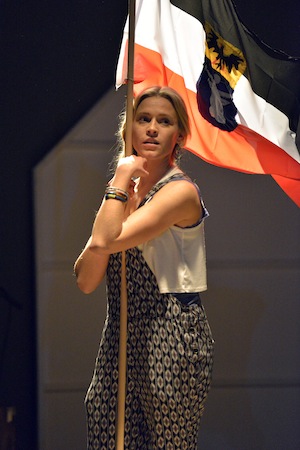The full title of Jackie Sibblies Drury's play, first produced in Chicago in 2012, is deliberately gauche and in need of editing. No review is complete without it, however, so here it is: We Are Proud To Present A Presentation About The Herero of Namibia, Formerly Known As Southwest Africa, From The German Sudwestafrika, Between The Years 1884 - 1915. As they enter through the rehearsal room at the Bush, the audience encounters the group of well-intentioned young people supposedly keen to tell us the tragic story of the first genocide of the 20th century. The walls are covered, as they are in most rehearsal rooms, with the results of earnest research, photographs and scribbled ideas. The cast are playing with a ball as we make our way into the theatre. They seem very young.
The play, pretending not to be a play, starts with the introduction to the "presentation". Everything is intended to look half-learned, improvised or still in-the-making. How are these twenty-something actors (acting being actors acting) going to tackle such an enormous subject? They flounder, of course, show off and talk in stereotypical terms about their motivation or rivalry. One - Actor 3/Another White Man (Joshua Hill) - might be Bottom's first cousin, blithely impersonating a Jamaican grandmother and confidently offering any accent or gender required. Another - Actor 5/White Woman (Kirsty Oswald, pictured below flying the Sudwestafrika flag) - is so immature as to be both suggestible and silly. To begin with, this process, as the group try to find their way into the subject, is sometimes funny but risks being irritating. Should such intellectual babies be let loose on these important matters?
Brooklyn-based Drury is actually attempting something both difficult and daring. She is asking questions about the purpose of theatre while introducing a terrible and largely forgotten horror which is also representative, not only of the legacy of colonialism, but - she seems to say - the here and now. Should theatre inform, teach, open questions or bring about understanding through empathy? Should it attempt all of these? And by what means? This is not theatre-in-education, although the set (by Lisa Marie Hall) might suggest explication as a map of Namibia, the modern name for South West Africa, is gradually removed to reveal sand. A version of the story of the cruel German treatment of the Herero tribe could be cleanly told, but history is a muddle and usually owned by the victor. The "actors" use what resources there are, the letters written by young Germans unhappily coping with desert, heat and a lack of home comfort. But can we truly discover the 19th-century black African's experience? The cast, and so "cast", are equally divided between black and white and the division begins to be expressed in current terms. This leads to the rather bleak suggestion that racism is always just beneath the liberal surface.
This is not theatre-in-education, although the set (by Lisa Marie Hall) might suggest explication as a map of Namibia, the modern name for South West Africa, is gradually removed to reveal sand. A version of the story of the cruel German treatment of the Herero tribe could be cleanly told, but history is a muddle and usually owned by the victor. The "actors" use what resources there are, the letters written by young Germans unhappily coping with desert, heat and a lack of home comfort. But can we truly discover the 19th-century black African's experience? The cast, and so "cast", are equally divided between black and white and the division begins to be expressed in current terms. This leads to the rather bleak suggestion that racism is always just beneath the liberal surface.
Gbolahan Obisesan directs the six, equal in their contribution to the ensemble - Ayesha Antoine, Joseph Arkley, Kingsley Ben-Adir, Joshua Hill, Isaac Ssebandeke and Kirsty Oswald - so that giggly experimentation gradually becomes a threatening show of vindictiveness backed by accelerating rhythmic sound. He combines with Drury to ask where reality begins and ends, how much excitement and emotion in the theatre can lead to serious consideration, but he does this with a proper understanding of the elements at his disposal. The climax is electric and its aftermath revealingly awkward and confused. The actors (or "actors") quite rightly do not break the spell by taking a bow.















Add comment